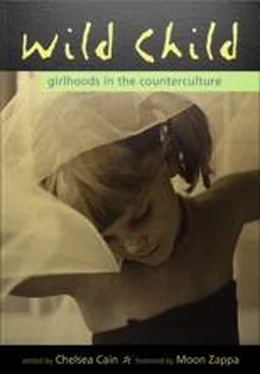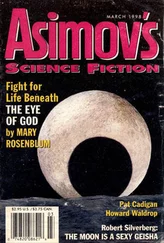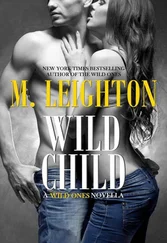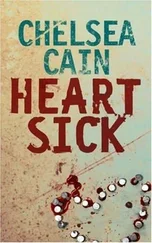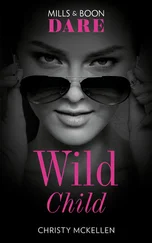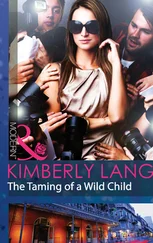My father’s attempt to unwind in the woods was a disaster. The sudden move from a cell to the wilderness seemed to leave him nervous and unsettled. The first day he tried to play the hip nudist and got a terrible sunburn. Then he drank some ‘fresh’ spring water and spent three days heaving in the outhouse. I stayed indoors with him while he recovered, making him tell me stories. ‘Me and nature never got along,’ he said.
But as the days drifted on, we settled into the place. My father taught me to use a BB gun in the field beside the commune’s main house. Arms around me from behind, he cheered when we shot the faded beer cans off the stump. ‘Sock it to me,’ he would say, holding out his enormous, olive-colored palm. We ate homemade bread and black beans which the women in the main house prepared, swam naked in the creek flowing through the property. One wall of the room we shared was given to me as painting space. I spent the afternoons scribbling figures on the white paint as high as I could reach, faces with huge, lidded eyes and no mouths, rapt but mute.
One day we wandered into one of the many rough-framed buildings on the property to take shelter from the midday heat. Cinder block and knotty pine bookshelves lined the walls. Up near the ceiling, a long sagging board supported Lenin’s collected works. A sink and countertop unit pulled out of a remodeled kitchen shored up one wall. There was no running water; spider webs stretched from the tap to the drain. A propane stove sat on the drainboard, and beneath it, on the floor, were jugs of cooking fuel and water.
My father moved to the open door, raised his arms up to the door frame and stretched like a cat. He was there in body-a body honed by hours in the weight room, on the courts playing ball with the other prisoners-but in another way he was fitfully absent. At five, I was having trouble pinpointing this. He circled the room slowly, traced a pattern in the countertop’s dust, not pent up, but aimless, as if he had lost something and didn’t know where to search. I squatted near the sink, playing with a set of plastic measuring cups, watched him closely. He moved through the doorway-for a moment framed by light, a dark cutout of a man-then passed out of view.
Thirsty, I decided to make a tea party. I went outside to see if my father wanted to play, and found him sprawled under a large oak tree near the door. He was staring up at the leaves, his hand spread open in the air above him, and didn’t answer at first.
‘Do you want some tea?’
He raised his head and his eyes slowly focused, placing me. ‘No thanks, honey.’
I went back into the shack and filled two of the cups from a jug on the floor. I pretended to have a partner for my tea, and chatted with him a while before drinking from my cup, thumb and forefinger on the short handle, my pinkie raised high.
From the first sip I could tell something was wrong. The water burned my tongue, and when I opened my mouth to scream all the air in the room was gone, there was only fierce vapor. I spat out what I could and yelled, feeling a white heat unfurl down my throat. My father dashed in, smelled my breath and the spilled gas and scooped me up from the floor. He ran with me toward the spring and over his shoulder I watched the shack jiggling smaller and smaller in the field. It seemed lonely, canted off to one side on its foundation like a child’s drawing of a house. The dry, summer hay swayed like the sea, and I heard his breathing, ragged as surf.
When we reached the spring, a bearded man was there filling a green wine bottle. Water spilled down a rock face into a pool bounded by ferns and moss. My father gasped out the story and together they hovered over me, making me drink from the bottle again and again. ‘That’s good,’ they said. ‘You’re doing really good.’ My father stroked my hair. And though I wanted to stop, I tipped my head back and drank for him.
That night we stayed in the main house. My lips and throat were chapped and burning. I began to have visions. A crowd of ghosts led by a goateed figure marched with torches through the room. I told this to the grownups and they seemed alarmed. Some of the other people staying at the house lit extra kerosene lanterns to soothe me, but I could still see the figures. The leader looked furious, driven, his whole body straining forward toward some unknown mission.
My father moved with me to a bedroom upstairs and held me in a worn corduroy arm chair, talking softly, telling me stories of what we would do together when it was light. The vagueness I felt in him during the day had disappeared. He was dense, focused, his legs pressed long against the sides of the chair, his arms around me heavy and still. I sat in his lap, leaning into the rise and fall of his chest. In my last rinse of delirium, I closed my eyes and saw his body supporting me like a chair, the long, still bones, and under him the real chair, fabric stretched over wood, and all of this twenty feet above the ground on the upper floor of the house, held up by the beams and foundation, and beyond that the quiet fields, silver under the moon, alive with animals, the punctured cans lying still by the stump. I saw us perched in the center of this, neither safe nor doomed, and in this unbounded space I fell asleep.
Strange and Wonderful
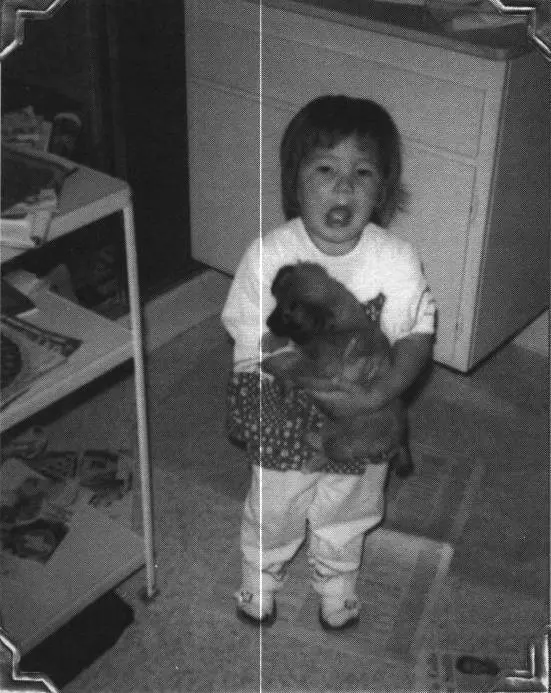
Sometimes in your life someone gives you permission to be exactly who you are. For me, that person was Nina.
Let me explain: I grew up listening to the Eagles, Air Supply and ABBA and watching The Monkees and The Brady Bunch on TV. I gave my Barbies first and last names and family histories. I learned to count to one hundred before kindergarten and tie my shoes before anyone else in class. I was the only one I knew of with more than one sibling and more than one parent living at home. I had a mixed heritage, half Chinese, half German; I conversed in English and cursed in Cantonese at school and at home. I attended Mass every Sunday and learned to pray the rosary. On birthdays and special occasions, I traveled with my family to San Francisco where we sat in banquet halls with hundreds of five-foot Chinese relatives, aunts and uncles and cousins twice removed who spoke Cantonese, ate fifteen-course meals and toasted with sparkling cider to happiness and good luck.
Outside of my family, my father said, there was no one you could trust. The world was a dangerous place, my father said. The only safe place was home. Now, nearly twenty years later, I know that sometimes it is dangerous to be safe. Sheltered-that’s how my friends and colleagues put it. My childhood, that is. Fiercely protected by a father I respected and feared as much as I loved, I grew up in the shadow of rules and regulations, of ‘Don’t do this’ and ‘Don’t do that.’ When other children were going to birthday sleepovers, I stayed home. It was dangerous at other people’s houses, my father reasoned. You never knew what was going on, what hurtful games children played, what danger parents either ignored or allowed.
Afraid of my being molested, my father taught me about sex when I was old enough to understand the word ‘no.’ By the time I was seven, I knew I was conceived by a bodily function, not delivered by a stork. There were other disclosures, too. When other kids believed in the tooth fairy and Santa Claus, I knew neither existed. My father tried to rob me of an imagination. Instead, he created a girl who would conjure up worrisome events that never happened, who would dream of disaster before it occurred, who would lie awake at night with a tummy ache and a headache and her mind in a whirl. Nothing was safe, although much was sacred. The body, especially. And the mind.
Читать дальше
